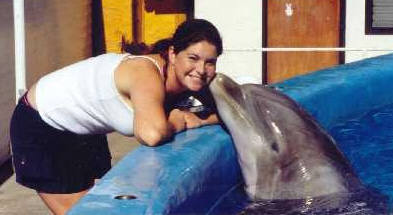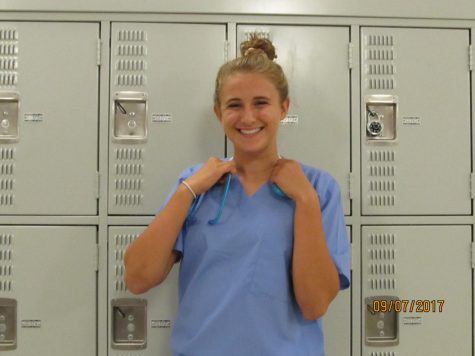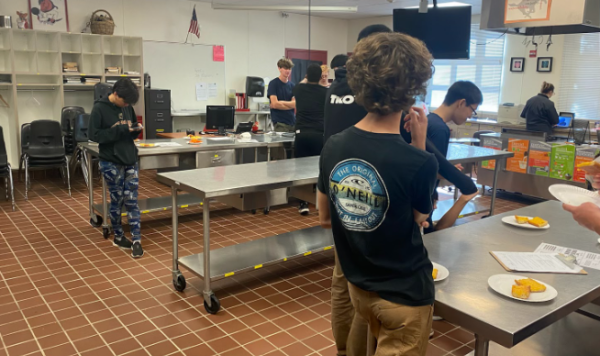A new class is washing ashore

Meghan Faerber, current biology teacher here at Monte Vista, is pictured here working with Akeakamai the dolphin in a cognitive research lab in Hawaii as a trainor.
March 26, 2015
Marine Biology is hitting the beach running at Monte Vista, taught by a true marine biologist herself.
Meghan Faerber currently teaches Biology and Accelerated Biology at Monte Vista. She also has a lengthy background of pursuing her interests career in marine biology through a multitude of expeditions in many different environments.
All her life, she has loved to study the sea and its inhabitants; in her time off from teaching, Faerber works at Stanford University doing research on the evolution of body size and ecology of marine animals from millions of years ago to the present.
“While I love teaching, I also really love research,” Faerber said. “So working at Stanford in the summers allows me to have both in my life.”
Science, the second highest rated scientific journal, recently published multiple papers based on the research Faerber helps with during the summer.
“It is one of the largest and most detailed studies of the fossil record to date,” Faerber said.
But before she came to teach and before she helped at Stanford, Faerber was out at sea watching marine mammals splash and play.
“I can’t actually pinpoint a specific moment [when I knew what I wanted to do], I’ve wanted to be a marine biologist since I was in elementary school,” Faerber said.
She says even when she was too young to know what it actually meant, her answer to “what do you want to be when you grow up” has always been marine biologist.
“I’ve just always had a draw to the ocean,” she said.
Faerber went to grad-school in the UK, tailoring all her classes toward her life in marine biology.
She began her career in a laboratory in Hawaii where she studied the cognitive abilities of captive dolphins.
“It was an amazing experience,” Faerber said. “I was a dolphin trainer for a couple years.”
But after some time, she realized this wasn’t quite the right field for her.
“I then realized that I actually had a hard time with captivity,” she said.
Faerber changed her focus to a more behavior based study of marine mammals in the wild. Using this path, she did research in Hawaii and the Canary Islands about the effect of sonar use by the navy on marine mammals’ sonar uses for her master’s thesis.
Faerber also spent time working at the Monterey Bay Aquarium with sea otters and rehabilitation, as well as some blue whale research off the coast of California.
“I lived on boats quite a bit,” Faerber said. “So I wouldn’t say I actually lived anywhere except offshore for several years because I would probably spend about 8 months at sea. It was usually 6 weeks on, at seas, and six weeks off. And usually during those six weeks off, I just traveled.”
Those many days at sea will come in handy when next year comes around and the teaching begins.
The new class will include a variety of subjects and projects. To name a few possible topics: marine mammals, jellyfish, sharks and rays, plankton, waves and currents. Some labs could include dissections of sharks, starfish and sea urchin and also maintaining aquarium tanks.
The class could also include trips to the Monterey Bay Aquarium, going tide pooling, or even whale watching.
Generally, when a new class is being introduced, there is a tedious process of getting materials together and deciding on the curriculum. However, because all the other high schools in our district already offer this class, not all the work was needed.
“Normally if a new class starts and you are starting it from scratch, you do have to go through a really extensive proposal of what will we taught [and] how it will be taught,” Faerber said. “I am very lucky that I came into a district that already did all that work for me.”
Marine Biology will be offered for grades 10-12 with the requirement of having completed Biology with a C or higher and also having taken Geometry. The class does count as a lab science for all out of state colleges, CSU’s and UC’s.
“The theme of marine ecosystem will drive the curriculum involving the coverage of classic biological concepts,” the course description said. “Many laboratory activities will be inquiry-based and involve live sea life.”












